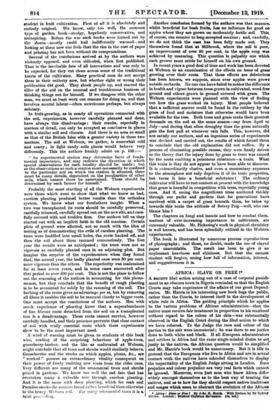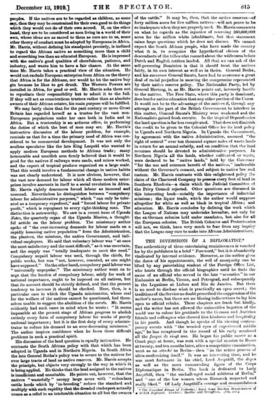AFRICA: SLAVE OR FREE 7*
A RECENT libel action arising out of a case of corporal punishment in an obscure town in Nigeria reminded us that the English Courts may take cognizance of the affairs of our great Dependencies. Mr. Harris in his interesting new book begs the public, rather than the Courts, to interest itself in the development of white rule in Africa. The guiding principle which he applies to the various problems of African administration—that the native must receive fair treatment in proportion to his manhood without regard to the colour of his skin—was substantially observed in the English Court during the libel action to which we have referred. To the Judgo the race and colour of the parties to the suit were immaterial ; he was there to see justice done to both white and black. If all European administrators and settlers in Africa had the same single-minded desire to act, justly to the natives, the African question would be simplified and Mr. Harris's book would be unnecessary. But it is idle to pretend that the Europeans who live in Africa and are in actual contact with the natives have schooled themselves to display the impartiality of the English Judge sitting in London. Race prejudice and colour prejudice are very real facts which cannot be ignored. Moreover, even just men who know Africa differ widely amongst themselves as to the best way of treating the natives, and as to how far they should respect native traditions and usages which seem to obstruct the evolution of the African peoples. H the natives are to be regarded as children, as some say, then they may be constrained for their own good to do things which they would not do of their own accord. If, on the other hand, they are to be considered as men living in a world of their ewn, whose ideas are as sacred to them as ours are to us, some other theory of conduct must be adopted by Europeans in Africa. Mr. Harris, without defining his standpoint precisely, is inclined to regard the African native as something more than a child and something less than an educated European. He is impressed with the native's good qualities of cheerfulness, patience, and industry, and wants him to have a fair chance. At the same time Mr. Harris takes a practical view of the situation. He would not exclude European enterprise from Africa on the theory that Africa is for the Africans, nor would he let the native buy gin because he likes to get drunk. The Western Powers are installed in Africa, for good or evil. Mr. Harris asks them not to repudiate their responsibility but to admit it to the full. If they will act as conscientious trustees rather than as absolute owners of their African estates, his main purpose will be fulfilled.
We may fairly claim that for the past century or more Great Britain has regarded herself as a trustee for the vast nonEuropeans populations under her care both in India and in Africa. But a trusteeship is an arduous office, in performing the duties of which the best of men may err. Mr. Harris's instructive discussion of the labour problem, for example, reminds us that for a time the primary need of Africa was considered to be commercial development. It was not only the soulless speculator like the late King Leopold who wanted to apply modern European methods to African trade ; many honourable and unselfish men firmly believed that it would be good for the natives if railways were made, and mines worked, and the export of tropical produce organized on a large scale. That this would involve a fundamental change in native habits was not clearly understood. It is now obvious, however, that the vast new demand for labour which all these modern enterprises involve amounts in itself to a social revolution in Africa. Mr. Harris rightly denounces forced labour as immoral and unsound. Nevertheless he distinguishes between " compulsory labour for administrative purposes," which " can only be tolerated as a temporary expedient," and "forced labour for private profit," which is repugnant to every right-thinking man. The distinction is noteworthy. We saw in a recent issue of Uganda Notes, the quarterly organ of the Uganda Mission, a thoughtful article on the labour problem. The missionary author spoke of " the ever-increasing demands for labour made on a rapidly lessening native population" from the Administration, the planters, the missions, the native Government, and individual employers. He said that voluntary labour was " at once the most satisfactory and the most difficult," as it was uncertain, and the supply was " totally inadequate to meet the need." Compulsory unpaid labour was used, through the chiefs, for public works, but was " not, however, resented, as one might have supposed." On the other hand, compulsory paid labour was " universally unpopular." The missionary author went on to urge that the burden of compulsory labour, solely for work of national importance, ought to be imposed on all natives, but that its amount should be strictly defined, and that the present tendency to increase it should be checked. Here, then, is a particular case in which the Uganda missionaries, whose zeal for the welfare of the natives cannot be questioned, feel themselves unable to suggest the abolition of the corvie. Mr. Harris evidently had such cases in mind when he wrote : " It seems impossible at the present stage of African progress to abolish entirely every form of compulsory labour for works of purely national importance ; but it is the first duty of every administrator to reduce his demand to an ever-decreasing minimum." The author inspires confidence when he faces these difficult problems in such a practical spirit. His discussion of the land question is equally instructive. Ho contrasts the South African policy with that which has been adopted in Uganda and in Northern Nigeria. In South Africa the late General Botha's policy was to secure to the natives for ever large trade of land as native reserves. Mr. Harris accepts the principle, but objects very strongly to the way in which it is being applied. He thinks that the land assigned to the natives is insufficient and unsuitable. He points out, however, that the natives " wastefully " occupy large areas with redundant cattle herds which by in-breeding' reduce the standard and multiply with such rapidity that the dreaded rinderpest actually comes as a relief to an intolerable situation to all but the owners of the cattle." It may be, then, that the native reserves—of forty million acres for live million natives—will not prove to be so inadequate when they arc properly used. Mr. Harris comments on what ho regards as the injustice of reserving 260,000,000 acres for the million white inhabitants, but that statement raises large questions which he does not discuss. We cannot expect the South African people, who have made the country what it is, to recognize the hypothetical claims of the descendants of the tribes who roamed about the wilderness before Dutch and English settlers landed. All that we can ask of the self-governing Dominion is that it should treat the natives fairly, in its own interest as well as in theirs. General Botha, and his successor General Smuts, have had to overcome a great deal of racial prejudice in securing the compromise represented by their native reserve policy. The Nationalist Party, led by General Hertzog, is, as Mr. Harris points out, intensely hostile to the natives. The Free State, where this party is dominant, does less for native education than any other portion of the Union It would not be to the advantage of the natives if, through any attempt on the part of the British Government to interfere in this matter, General Smuts's Ministry were weakened and t.ho Nationalists gained fresh recruits. In the tropical Dependencies the land question is far leas complicated. That does not diminish the credit to be given to the Colonial Office for its land policy in Uganda and Northern Nigeria. In Uganda the Cos-eminent, by agreement with the native Administration, assumed "the right of control " over ten thousand square miles of waste lands in return for an annual subsidy, and on condition that the land revenues should be devoted to administrative purposes. In Northern Nigeria all the lands, whether cultivated or waste, were declared to be " native lands," held by the Governor "for the use and common benefit of the natives," inalienable without the Governor's consent, and subject to native law and custom. Mr. Harris contrasts with this enlightened policy the claim of the Chartered Company to posses* every foot of land in Southern Rhodesia—a claim which the Judicial Committee of the Privy Council rejected. Other questions are discussed in this interesting book—notably the importance of industrial missions ; the liquor trade, which the author wuu1d suppress altogether for white as well as black in tropical Africa ; and education. Mr. Harris concludes by defining the work which the League of Nations may undertake hereafter, not only for the ex-German colonies held under mandates, but also for all the European colonies. The British Colonies and Protectorates will not, we think, have very much to fear from any inquiry that the League may care to make into African Administrations.



















































 Previous page
Previous page